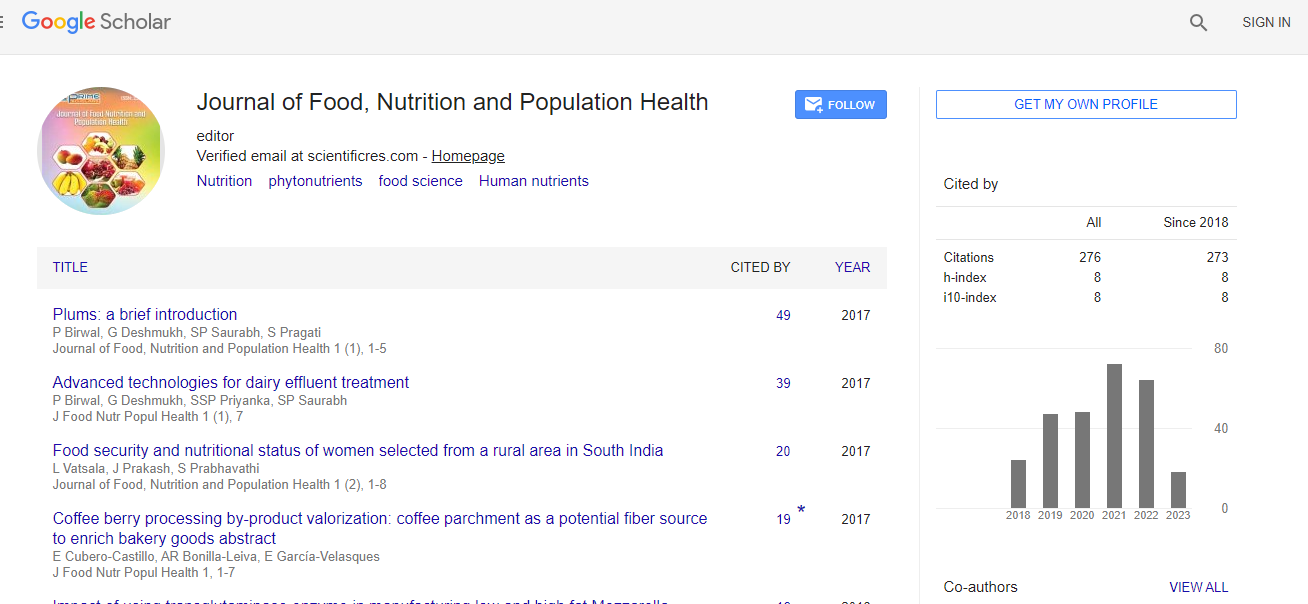Commentary - (2024) Volume 8, Issue 3
Embracing Health Food Habits for a Better Life
Wei Li*
Department of Food and Nutrition, Keio University, Japan
*Correspondence:
Wei Li,
Department of Food and Nutrition, Keio University,
Japan,
Email:
Received: 02-Sep-2024, Manuscript No. IPJFNPH-24-21233;
Editor assigned: 04-Sep-2024, Pre QC No. IPJFNPH-24-21233 (PQ);
Reviewed: 18-Sep-2024, QC No. IPJFNPH-24-21233;
Revised: 23-Sep-2024, Manuscript No. IPJFNPH-24-21233 (R);
Published:
30-Sep-2024, DOI: 10.21767/2577-0586.8.3.29
Description
In an era where health consciousness is at an all-time high, the
adoption of sound food habits has never been more critical.
Embracing health food habits isn’t just about following trends;
it’s about making a lifestyle shift that can profoundly impact
overall well-being. Here’s a review on why these habits matter
and how they can be seamlessly incorporated into daily life.
One of the cornerstones of healthy eating is choosing whole
foods over processed ones. Whole foods such as fruits,
vegetables, lean proteins, whole grains, and nuts—are packed
with essential nutrients, fiber, and antioxidants that processed
foods often lack. They help regulate digestion, support immune
function, and maintain a healthy weight. Processed foods,
in contrast, are typically high in sugars, unhealthy fats, and
artificial additives, which can contribute to chronic health issues
like obesity, diabetes, and heart disease. A balanced intake of
macronutrients—proteins, carbohydrates, and fats—is crucial
for maintaining energy levels and overall health. Proteins are
essential for muscle repair and immune function, carbohydrates
provide energy, and fats are necessary for hormone production
and cell function. Health food habits emphasize the importance
of not just consuming these macronutrients but doing so in
the right proportions. For instance, complex carbohydrates
found in whole grains and legumes are preferred over refined
carbs, and healthy fats from avocados and nuts are favored
over trans fats. Understanding portion sizes is key to managing
calorie intake and preventing overeating. Health food habits
encourage mindful eating being aware of hunger cues and
eating until you’re satisfied, not stuffed. This approach not only
aids in weight management but also enhances digestion and
reduces the risk of metabolic disorders. Tools like measuring
cups or simply learning to gauge portions visually can be helpful
in developing this habit. Water is often underestimated in its
importance, yet staying hydrated is fundamental for health.
Proper hydration supports digestion, nutrient absorption, and
energy levels. It’s generally recommended to drink at least
eight 8-ounce glasses of water a day, but individual needs can
vary based on activity levels, climate, and personal health.
Infusing water with fruits or herbs can make hydration more
enjoyable and provide additional nutrients. Mindful eating
involves paying full attention to the experience of eating and
drinking. It’s about savoring each bite, recognizing hunger
and satiety signals, and appreciating the flavors and textures
of food. This practice can lead to better digestion, a healthier
relationship with food, and reduced instances of overeating. It
also encourages a more thoughtful approach to food choices,
often leading to healthier decisions. Meal planning and
preparation are powerful tools for maintaining health food
habits. Planning meals ahead of time helps ensure balanced
nutrition and reduces the likelihood of resorting to unhealthy
convenience foods. Preparing meals in advance can save time,
reduce stress, and allow for better control over ingredients
and portion sizes. Investing in a few good containers and
dedicating some time each week to meal prep can pay off in
improved health and convenience. While focusing on health,
it’s important to remember that food should be enjoyable.
Extreme restrictions can lead to dissatisfaction and unhealthy
relationships with food. The key is moderation allowing for
occasional indulgences while maintaining a foundation of
healthy eating. This balanced approach fosters long-term
sustainability and can make health food habits feel less like
a chore and more like a natural part of life. Adopting health
food habits is a journey that can greatly enhance your quality
of life. By prioritizing whole foods, balancing macronutrients,
practicing portion control, staying hydrated, eating mindfully,
planning meals, and embracing moderation, you set yourself
up for lasting health benefits. It’s not about perfection but
rather progress and consistency. With time and practice, these
habits can become second nature, leading to a healthier, more
vibrant life.
Acknowledgement
None.
Conflict Of Interest
None.
Citation: Li W (2024) Embracing Health Food Habits for a Better Life. J Food Nutr Popul Health. 8:29.
Copyright: © 2024 Li W. This is an open-access article distributed under the terms of the Creative Commons Attribution License, which permits unrestricted use, distribution, and reproduction in any medium, provided the original author and source are credited.

